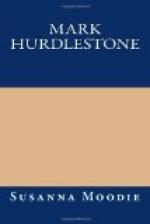“You think it, then, your duty to love me?”
“Yes. You are my husband. My heart is lonely and sad. It must be filled by some object. Dear Marcus, suffer me to love you.”
She laid her fair cheek meekly upon his knee, but he did not answer her touching appeal to his sympathy with a single caress.
“I cannot make you happy, Elinor. Algernon alone can do that.”
“Algernon! Why Algernon?” said Elinor, bursting into tears. “Is it to make me more miserable that you constantly remind me of my loss?”
“How do you know that he is dead?”
“I have your word for it; the evidence of your friend’s letter; his long silence. What frightful images you conjure up! You seem determined to make me wretched to-night.”
She sprang from her lowly seat, and left the room in an agony of tears. Mark looked after her for a moment:—“Aye, he still keeps your heart. But I have had my revenge.”
The agony which he had endured in the garden on that memorable night, when he first discovered that Elinor loved his brother, was light in comparison to the pangs which shook the inmost soul of his unhappy wife, when time at last revealed the full extent of her misery, and of her husband’s deep-laid treachery—and Algernon returned from India with an independent fortune to claim his bride, and found her the wife of his brother.
The monster who had supplanted him in his father’s affections had now robbed him of his wife. Algernon did not seek an explanation from Mrs. Hurdlestone, either personally or by letter. He supposed that her present position was one of her own choosing, and he was too proud to utter a complaint. The hey-day of youth was past, and he had seen too much of the world to be surprised at the inconstancy of a poor girl, who had been offered, during her lover’s absence, a splendid alliance. He considered that Elinor was sufficiently punished for her broken vows in being forced to spend her life in the society of such a sordid wretch as Mark Hurdlestone.
“God forgive her,” he said; “she has nearly broken my heart, but I pity her from my very soul.”
When the dreadful truth flashed upon the mind of Mrs. Hurdlestone, she bitterly accused her husband of the deception he had practised. Mr. Hurdlestone, instead of denying or palliating the charge, even boasted of his guilt, and entered into a minute detail of each revolting circumstance—the diabolical means that he had employed to destroy her peace.
This fiend, to whom in an evil hour she had united her destiny, had carefully intercepted the correspondence between herself and Algernon, and employed a friend in India to forge the plausible account he had received of her lover’s death—and finally, as the finishing stroke to all this deep-laid villany, he had overcome his avaricious propensities, and made Elinor his wife, not to gratify a sensual passion, but the terrible spirit of revenge.




